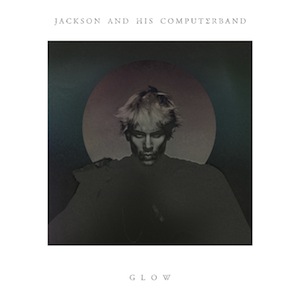Jackson and His Computerband Glow
Part of anticipating a “comeback” album—a new album by an artist who hasn’t released in […]

Part of anticipating a “comeback” album—a new album by an artist who hasn’t released in five-plus (in this case, eight) years—is wondering how and if that artist will age with the trends. This must be especially in the minds of Jackson and His Computerband fans, because the artist sounded particularly forward-thinking on his 2005 debut LP, Smash. That record still feels like both a partner and an antecedent to so much. Its hyperactive, pop-locking style of glitchy funk fit snugly alongside its then-contemporaries Mr. Oizo and Jimmy Edgar, but in its stadium width, Smash also slightly predated the Ed Banger/Institubes axis that would dominate French dance output for years to follow—when Justice blew up, the duo widely touted the LP as an influence. A video trailer for Glow, Jackson Fourgeaud’s return to the album format, featured a track with an enticing, uncommonly sculpted, mid-range chainsaw worm, promising in some way to subvert the muck associated with Ed Banger, bro-house, bro-step, EDM, etc. This track (“Seal”) is indeed on the album, but it’s a rare moment of singularity.
Glow feels bloated from the start. Opener “Blow” is virtually the opposite of Smash‘s glorious first track, “Utopia,” as its pitch-bent singalong and stadium-rock chug come across archly. The aforementioned “Seal” fares better, even (debatably) verging on the epic, but it’s followed by a series of mind-numbing electro-rock pieces that hamper whatever momentum the album had going for it. From the lumbering “Dead Living Things,” with its neanderthal bassline and silly yelped vocal, to the high-octane pummel of “Blood Bust” or the cloying, melancholy ballad “Memory,” it would seem that Fourgeaud has totally forgotten what made people wait eight years for him. And this is only halfway through the LP’s hour-plus runtime.
One wonders when Fourgeaud wrote some of these tracks. Many of them, like the thudding “Arp #1” and mid-range-compressed “Pump,” wouldn’t have sounded out of place during the 2006-2007 “electro” heyday. Some have hooks, sure, and the sound design is compelling at times. But knowing what the producer is capable of, it’s hard not to be disappointed. In hindsight, Smash can sound a little dated, but it still hangs together pretty well; it’s meticulous, busy, and clattering, but it’s also towering with emotion. Its deft cut-and-paste construction is rarely found on Glow, though parts of “Vista” hint at it. Fourgeaud has always had a playful side, but here it comes across as a joke—possibly about making an ELO album on a laptop—taken too far. For the most part, it’s a clumsy, and frankly unnecessary effort. The hype cycle puts an annoyingly high premium on artists’ release schedules, but sometimes a record can truly spend too long in the oven.

